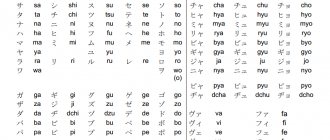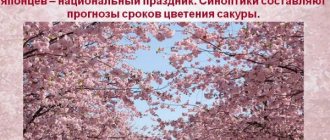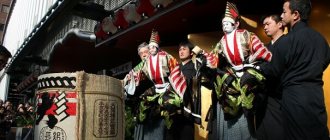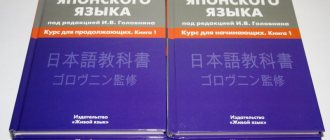Some people believe that the Japanese do not have swear words, but those who decide to study at a language school in Japan learn from new Japanese friends that the Japanese use more than just the harmless “baka” as a swear word.
Learning Japanese is sometimes difficult, but very interesting. It is lexically very rich, therefore, as it may not seem surprising to some, it is replete with various curses and obscene words. However, in this the Japanese language is no different from any other languages.
Let's look at the top five most offensive curse words in the Japanese language. After all, in order to learn the Japanese language, you need to know not only commonly used colloquial vocabulary, but also master speech patterns and lexical units related to slang and even swear words. There is nothing shameful in this, because learning a language presupposes complete mastery of its speech nuances, the main thing is to use the acquired knowledge correctly and appropriately. It is necessary to know such speech patterns in order to recognize and understand them, but in no case should you use them in official communication.
#1 Offensive words that indicate low intelligence
Most often, the Japanese use the words キチガイ (kichigai / kitsigai) and カス (kasu) to insult a person on his intellectual basis. Those who have already started studying Japanese in Japan or are learning the language on their own are most likely familiar with the word “baka”, which is most often translated as “idiot”, but there are other lexical equivalents in Japanese that are more offensive, for example , “aho” (idiot) or “boke” (kaka...ki instead of brains). But the most offensive words in this regard are “kasu” (complete idiot, idiot) or “kitsigai” (slow).
Kasu is a word that literally means "a useless, complete person with no intelligence." Kitsigai is a word more commonly translated as “crazy,” but has a much more offensive meaning. As a rule, these words are censored when used in official speech, both oral and written, due to their obscenity.
The use of such words is considered to be discriminatory towards people suffering from mental illness. Such words, of course, can be used in a close circle of acquaintances, but in no case in communication with others, so you will not hear them on television or see them in the print media.
Often the word "kono" is used as a prefix with the words "kasu" and "kichigai", turning the mentioned curse words into "kono kasu" or "kono kichigai".
The use of this prefix means addressing a specific person and it is assumed that your attitude towards him is very bad, and you do not want to have any relationship with him in the future.
Usage example: 何だ、こんなこともわかんねぇのか?このキチガイ。 (Nan da, konna koto mo wakannee no ka? Kono kichigai) – Didn’t you know that? You're a real idiot.
Parting
It's time to part ways. It would be a good idea to end the dialogue in such a way that your interlocutor would be pleased to meet you again. And how to do it? Now let's teach!
| Phrase in Japanese | Writing in Hiragana | Transcription | Translation |
| さよなら! | さよなら! | Sayonara! | Goodbye! The simplest option. Suitable for formal occasions. |
| またね! | またね! | Mata ne! | See you! Informal option. |
| また明日! | またあした! | Mata asita! | Till tomorrow! Informal option. |
| じゃあね! | じゃあね! | Jia: ne! | Bye! Informal option. |
| お休み(なさい)。 | おやすみ(なさい)。 | Oyasumi (nasai). | Good night! Adding "nasai" makes it more polite. |
| 失礼します。 | しつれいします。 | Shitsurei shimas. | Goodbye! A polite option when you are saying goodbye to someone superior. For example, leave the classroom where the teacher remains. |
| 気を付けて! | きをつけて! | Ki o tsukete! | Take care of yourself! When you don’t see someone for a long time, when someone leaves your house, and so on. |
So we have a kind of “Japanese phrasebook” of basic phrases in Japanese. Now you know how to properly introduce yourself, say hello and goodbye, thank and apologize. However, perhaps you'll be traveling to Japan soon and need tourist expressions ? We recommend watching our video about useful phrases for traveling to Japan. You will learn how to say that you are lost, ask how much this or that thing costs, and find out where this or that place is.
Well, our article has come to an end. Of course, there are many more similar phrases, but you will become familiar with them as you learn Japanese. Well, this is the basic minimum! We wish you success!
basic phrases in Japanese with transcription in this article. Greeting, gratitude, apology and farewell in Japanese.
Source
No. 2 Insults aimed at women: あばずれ (abazure), やりまん (yariman)
In any language there is a group of words and speech patterns that rudely insult a certain gender. The Japanese language is no exception in this regard. If you want Japanese women to hate you, you can use words like “abazure” (bitch) or “yariman” (whore).
The word "abazure" is derived from "abaremono" - one who does something abnormal. This insult used to be used for both men and women in Japanese. It was especially used in this context during the Edo period, but in modern Japanese the insult is used exclusively in relation to women. As for the word “yariman”, we’ll talk about its etymology a little later.
To be fair, the most common insult to men in Japanese is “yarichin.” Moreover, the word “chin” comes from “chinko” - penis. The word "yarichin" means "impotent". For Japanese men, insults related to sexual viability are very offensive.
Usage example: Kane wo yokose, kono abazure! -Give me the money, bitch!
Japanese swear words| views: [ 1469 ] |
Can you swear in Japanese? Here is a small selection of typical not-so-good Japanese words. No, not at all in terms of “learn and memorize”, but at least simply for more complete personal development - and the anime will be more understandable to watch in the original and the quality of the translation can be more fully assessed. Well, just, so to speak, it will be useful for information in life.
Japanese swearing and obscene language
You will often hear that the Japanese are very polite people, and the Japanese language is bad with swearing and obscenities. This is not entirely true. ^_^
Curses Simatta (shimatta) - “Damn, damn, bummer.” Shimaimashita - A more polite form with the same meaning. Used in decent . Pronounced while exhaling when things are going wrong. Kuso/xo (kusou) - “Shit.” Can be used figuratively. Often in the form of an exclamation. Chikusho/tiksho (chikushou) - “Bitch.” Quite a sharp form. Often used not as an insult, but as an exclamation. Atchi ni ikeyo - “Get out of here.” Zakkenayo! (Zakkenayo!) - “I went to...”. Uzatte! (Uzatte!) - “I went to...”. Shinjimae! (Shinjimae!) - “Get the hell out!” Chinpunkanpun - “I don’t know shit about it.” Bu- (bu-) - Verbal obscene prefix. Let's say, “bu-kkorosu” roughly translates as “I’ll kill you in hell.” ^_^
Insults Kikkake is a “poser”, a person trying to appear cooler than he is. Chikushoumou - “Son of a bitch.” Ama (ama) - “Bitch.” Literally translated as "nun". ^_^ Baka (baka) - “fool”. Not a very offensive expression. Often used by children. Bakayarou - A more offensive and “cool” form of the previous one. Used by men and in relation to men. The meaning is closer to “bastard”. Aho (ahou) - “Idiot, imbecile.” Temae/Temee (temae/temee) - An offensive masculine version of the pronoun “you”. Usually in relation to the enemy. Something like “bastard” or “bastard.” Honore (onore) - The same thing, but more roughly. Kisama - The same thing, but even more rude. Kono-yaro - “Bastard.” Kusotare - “Idiot, moron.” Literally, “head made of shit.” Reiji (reijii) - “Psycho”. Ojousama - "Princess", a spoiled girl from a rich family. Happo bijin - A two-faced person who sucks up to everyone. Yariman - "Whore." Kosho benjo - “public restroom”, a girl who refuses no one.
Obscenities Esu (esu) - To have sex, from the English pronunciation of the letter "s". Etchi suru - To have sex, to “fuck”. ABC (ABC) - Designation of degrees of seduction. A - kisses, B - caresses, C - sex. There is also D - pregnancy. Omonkuu - Giving a blowjob. Enjo kosai - “Dating for money.” A form of hidden prostitution in which high school girls go on dates with older men. They don't always have sex when they date. Such services are often paid not with money, but with fashionable, expensive gifts - sneakers, cosmetics, and so on. Kogyaru (kogyaru - from kogirl) - “Party girls”. High school girls who spend all their free time hanging out with friends in the fashionable and expensive areas of big cities - most notably in Tokyo's Shibuya district. Kogyaru follow the strangest innovations of youth fashion, love to dress unusually, wear strange makeup, and spend money on the latest models of cell phones and pagers. Many kogyaru make money through prostitution and enjo kosai. Ogyaru (ogyaru - from ogirl) - The most radical type of kogyaru. Vagrants who have not been home for months and live in party apartments or simply on the street. They are famous for spreading sexually transmitted diseases. Burusera (burusera - from bloomer seller) - A girl who makes money by selling her used panties to sex shops for fetishists. Aka Chochin - "Red Quarter", area of prostitutes. Fuzoku (fuzoku) - “Addition”. All types of sex services that do not include actual sex. First of all, this is striptease and massage. Bukkake is a genre of Japanese pornography that focuses on male orgasms and the “spreading” of sperm. Gaisen - “Preferring foreigners.” Garisen - “Preferring thin people.” Debusen - “Prefers fat people.” Sukebe - "dirty old man." Tikan (chikan) - “molested.” Shosui - To urinate, to take a leak. Musei - “Wet sleep”, involuntary nocturnal ejaculations. Dembu (denbu) - Back. Ketsu - “Ass.” Ketsunoana - “Ass.” Unko (unko) - Feces, "shit". Titi (chichi) - Breasts, “tits.” Oppai - “Buffers.” Chibu - Genitals, “closets”. Dancon (dankon) - Penis. O-tin-tin (o-chin-chin) - “Friend” (affectionately about the penis). Chipatama - Head of the penis. Bokki - “rising” (about a member). Momo - Vagina, “slit”, literally “peach”. Wareme (wareme) - Vagina, “cunt”.
© ru_anime, 11/18/2010
See additionally:
If you are interested in information on the rest, look at other sections of the site!
If you didn't find what you were looking for, see our catalog for additional information. We do not always have time to add new reviews and reviews to the site, but the catalog is always updated first. Download the catalogue, you won’t regret it! There are a lot of interesting things there!
In addition, there is an interesting offer for everyone. If you love, and most importantly, know how to write reviews and reviews, or just want to share your impressions of a movie, game, or something else you watched, we will always and with great pleasure post your text on the pages of our website
All necessary “copyrights” and so on, of course, will be fully preserved.
Do you want to bask a little in the rays of fame and glory? Then send your texts to our email!
| | | | |
No. 3 Insult consisting of a wish for death
Wishing someone to die is often heard in both movies and anime. Quite often, such statements are not as offensive as those described above. Most often on television and in animation, the informational message of such statements does not imply a specific wish for death, but the desire of the speaker to never see the person again. Notable in this regard is the Japanese saying “shi'ne”, which can be translated as “go to hell.” But in Japanese there is a more offensive word - “kutabaru”, which can be translated as “die.” This word is considered so rude that it is most often subject to censorship in the media.
Usage example: 謹んで申し上げます、くたばれ、ボケ。 (Tsutsushinde moushiagemasu, kutabare boke) - I wish you would die, idiot.
Acquaintance
When interlocutors first get to know each other, they usually first talk about themselves and express hope for mutual support. In Japanese this is called 自己紹介 - "jikosho kai", which can literally be translated as "self-presentation". A sort of self-presentation. an established pattern in Japanese society .
It should be noted that the Japanese language has several levels of politeness . Here, with the exception of some points, phrases of two levels will be presented. Polite/Formal - Suitable for all occasions. It is universal , at least in the initial stages. Informal is the level of politeness of speech among friends, close colleagues, and the like. Be careful in choosing your phrase - the wrong level of politeness will alienate a person or even offend him.
A small note: in transcription, the colon after a vowel indicates its length.
So, the first phrase in your story about yourself is 初めまして (はじめまして). It reads “hajimemashite” and translates as “nice to meet you.”
Then you say your name. Here are several options:
| Phrase in Japanese | Writing in Hiragana | Transcription | Translation |
| (私は)nameです。 | (わたしは)nameです。 | (Watashi wa) name des. | I am the name. The simplest and not too formal option. “Watashi wa” can be added or omitted. |
| 私は name と言います。 | わたしは name といいます。 | Watashi wa name is iimas. | My name is my name. This is a more complicated option, but also more impressive, if I may say so. |
| 私は name と申します。 | わたくしは name ともうします。 | Watakushi wa name to mo:shimas. | My name is my name. A very official and formal option. Used where appropriate. It's better to save it for important events. |
After the greeting, you need to tell about yourself. The Japanese usually perceive people based on their belonging to a place - a place of study, a place of work. This is as important as your name. There is usually only one pattern here - type of activity. Here are a few examples:
| Phrase in Japanese | Writing in Hiragana | Transcription | Translation |
| 学生です。 | がくせいです。 | Gakusei des. | I am a student. Including school students. |
| 大学生です。 | だいがくせいです。 | Daigakusei des. | I am a university student. |
| 医者です。 | いしゃです。 | Isya des. | I am a doctor. |
| 技師です。 | ぎしです。 | Gisi des. | I am an engineer. |
| 教師です。 | きょうしです。 | Kyo:shi des. | I'm a teacher. |
Naturally, if you already know how, you can use the genitive suffix の to add the name of the school or university where you study, or the company or institution where you work.
The “self-introduction” ends with a template phrase in which the speaker expresses the hope that the acquaintance will be pleasant and strong. There are several options here too:
| Phrase in Japanese | Writing in Hiragana | Transcription | Translation |
| よろしくお願いします。 | よろしくおねがいします。 | Yoroshiku onegai shimas. | I hope for your goodwill! A fairly polite phrase suitable for any occasion. |
| よろしくお願いいたします。 | よろしくおねがいいたします。 | Yoroshiku onegai itashimas. | I hope for your goodwill! A very polite option for special occasions. |
| よろしく。 | よろしく。 | Yoroshiku. | Nice to meet. An informal option, suitable for friends. |
Let's see what happened in the end. This is the basic pattern for almost all cases , since it is polite enough:
初めまして。私はnameと言います。 occupationです。よろしくお願いします。
name といいます。occupation です。よろしくおねがいします。
Hajimemashite. Watashi wa name is iimas. occupation of des. Yoroshiku onegai shimas.
Nice to meet you. My name is name . I am an occupation . I count on your kindness.
The template can be changed at your discretion. Before the final phrase, information about your specialty, age, and hobby fits well. This will make your story about yourself more complete. However, if you are just starting to learn the basics of the Japanese language, the above phrases will be enough for you.
#5 The rudest Japanese insult. まんこ (manko)
“Manko” belongs to that group of curses that are indecent to utter even among very close people. Moreover, this word is not just a curse word, but a real taboo. It is worth noting that some cultural figures who tried to use the so-called. art "manco" were brought to justice.
Above we wrote about the curse word “yariman”, and so, it is formed from the word “man”, which, in turn, originated precisely from “manko”, associated with the female reproductive organ in an abusive form.
Usage example:を渡らせてください! (Dou ka watashi ni sekaihatsu to narimasu, manko no 3D skyanaa taiken to, 3D manbooto de umi wo watarasete kudasai!) – Help me become the first person to make a 3D copy of a pussy (the translation is intentionally affectionate, the literal translation assumes a rude swear word meaning the female reproductive organ), with which I will make an amazing boat!
So, you are now familiar with the five most rude obscene and offensive words that you are unlikely to learn about in class while studying at a language school in Japan.
It's better not to use it: まんこ (manko)
Manco is one curse word that is best not said out loud. It's like the Voldemort of curse words.
Remember the word "slut" we mentioned above, yariman? However, we did not go into detail about its meaning. So, yariman comes from manko, literally meaning “one who is not the owner of her manko.” Such a sexist word.
In fact, this word is used very rarely. Sometimes it can be heard during the communication of very close male friends.
Well, since this word is not customary to say out loud, then there will be no example of its use.
Let us repeat once again that you should not use curse words in life, and in this article they are presented solely for general development.









